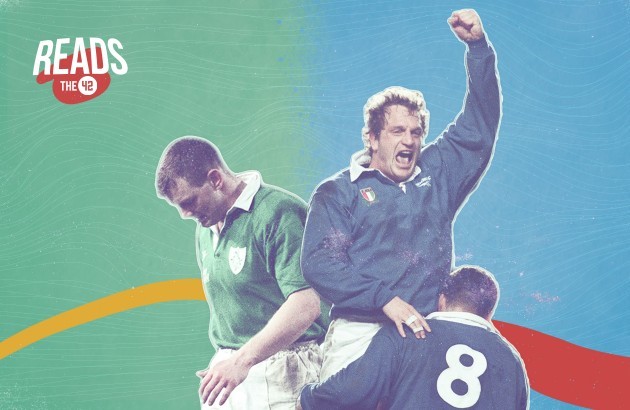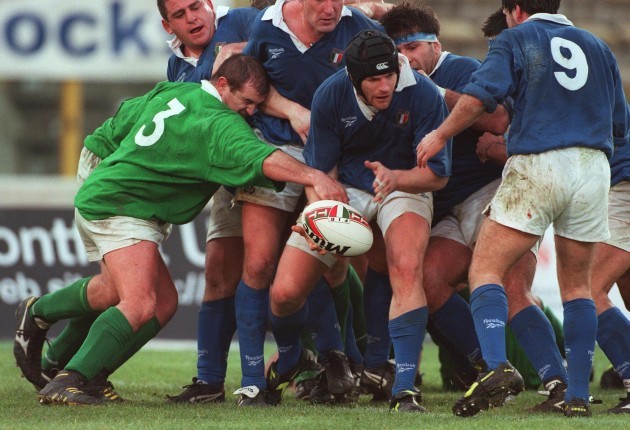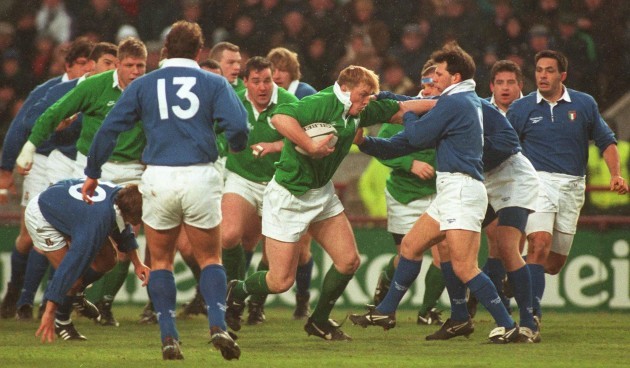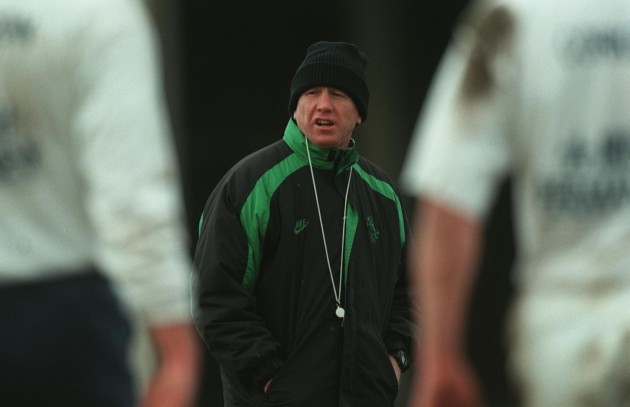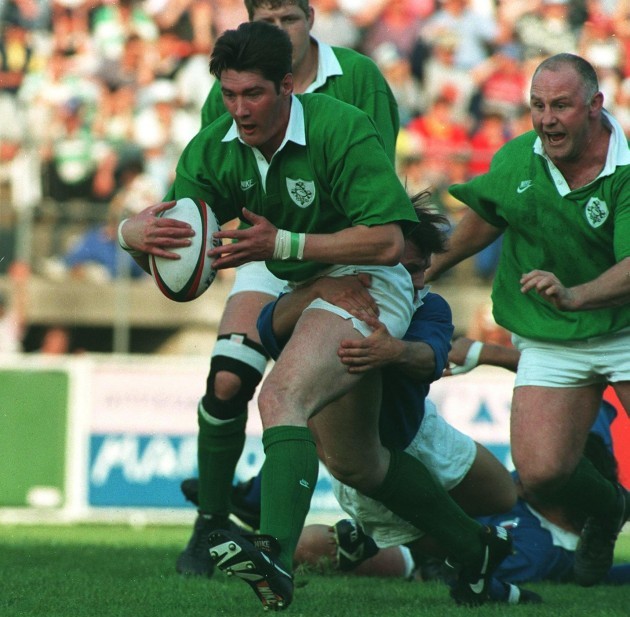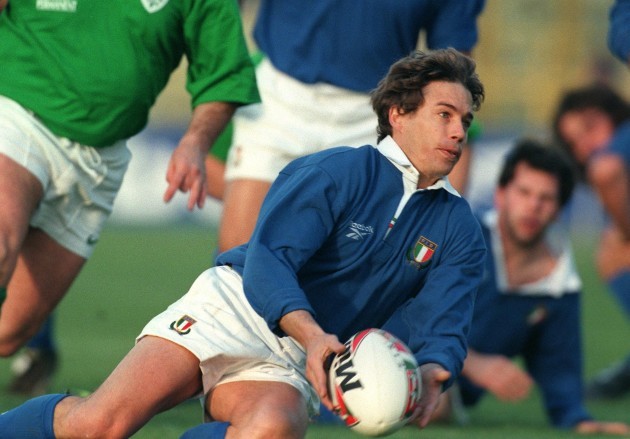WHEN NICK POPPLEWELL stood in the car park of an Alan Partridge-type hotel in May 1995, a bitter reality dawned. Professionalism was on the way into rugby but the bus to bring Popplewell and his Irish team mates to the Stadio Comunale di Monigo in Treviso, was not.
Time passed. The players stood still. The man from the IRFU made a series of frantic phone calls. No joy. No bus, either. Kick-off for Ireland’s fifth international of the year – a crucial warm-up ahead of that year’s World Cup – was fast approaching. And the Ireland international team – in every sense of the word – was going nowhere.
Panic ensued. Taxis were called; passing cars stopped. Popplewell, a starting Lion on the tour to New Zealand just a couple of years earlier, thumbed a lift to the stadium for his 32nd international cap.
Joe Schmidt was giving out a few years ago about their bus being 15 minutes late for Murrayfield,” Popplewell said. “Well, by the time we got to the ground, we’d 15 minutes to get ready. They wouldn’t change the kick-off time or anything like that.”
They’d pay the price. Italy, inspired by Diego Dominguez, won 22-12. Two years later they repeated the trick in Lansdowne Road and if anyone still thought their results were flukes then a third win on the trot in Bologna disproved that theory once and for all.
“There are no easy games in international rugby,” said Ireland coach, Brian Ashton, before that third defeat.
He was wrong. In the 1990s, when Ireland’s name appeared on the fixture list, opposition teams licked their lips – especially the Italians.
Wasted talent
The 1990s were Irish rugby’s worst decade. Aside from Wales, they were given the run around by just about everyone else. Namibia beat them twice in 1991, Samoa defeated them in 1996. France? Ireland played Les Bleus 11 times in the decade – and lost all 11. Scotland? 11 games, 10 Scottish wins, one draw. England. Ten games, eight wins for England, two for Ireland.
South Africa, Australia and New Zealand? Disaster mixed with the odd near miss.
You wonder how it came to this especially when you scan the team-sheets. Popplewell was not the only Lion in the Ireland pack, joined by another four – Keith Wood, Paul Wallace, Jeremy Davidson and Eric Miller – in Bologna in 1997. Italy won 37-22. We haven’t even mentioned Reggie Corrigan, Peter Clohessy, Malcolm O’Kelly, Paddy Johns, Anthony Foley, Eddie Halvey and David Corkery yet. They all played in at least one of those three Italian games. And they all lost.
- For more great storytelling and analysis from our award-winning journalists, join the club at The42 Membership today. Click here to find out more >
Popplewell’s story from Treviso is the perfect metaphor for that era. Ireland really had missed the bus as the rest of the Tier One nations grasped the concept of professionalism. “First time I was ever in a squad for a Five Nations game was in 1995,” says Shane Byrne. “Cardiff Airport. Four coaches arrived to bring the travelling party to the hotel. The alickadoos (officials) and their wives boarded the first three of those. The players had to wait for the last one before we got out of the airport.”
Other stories you probably know. There’s the one from David Corkery about the ’94 tour to Australia. Passing the Wallaby dressing room, he noticed oxygen masks for each of their players; entering the Irish one, he was greeted by a bowl of jelly beans in the middle of the floor.
Pints formed part of the pre-match routine, never mind the craic that was had afterwards.
Then there was the bus saga in Treviso yet while they may not have had a coach to transport them from their team hotel, they had no shortage of head coaches between 1995 and 1998, Gerry Murphy giving way to Murray Kidd, whose brief, unsuccessful tenure ended, predictably enough, with a defeat to Italy.
“Murray was old school,” Corkery says. “We’d meet on a Wednesday, train hard then, train hard Thursday, do something light on a Friday, and by the Saturday we’d run out of steam with 15 minutes to go. I don’t hold anyone accountable because the culture then was just different. The game might have gone professional but no one knew what to do. I went to Bristol because they paid me money to go there. But believe me, they made a bollix of things as well.”
Irrespective of how Bristol ran their affairs, they couldn’t compete with the IRFU for a lack of joined up thinking. Kidd would leave after that 37-29 Italian defeat in January 1997, the sixth loss from his nine-game reign. Enter Ashton, a big ideas man and a central plank of his philosophy was to scour the English Premiership for Irish-eligible players. He would find them too, unearthing Dylan O’Grady (who would later be jailed) and David Erskine in time for a return trip to Italy in December 1997. Corkery was out in the cold and browned off.
“I’d rather go to war with (Eddie) Halvey, Quinny (Alan Quinlan) or Axel (Anthony Foley) than Erskine or O’Grady. Like has anyone any idea now how good a player Halvey was? That man was the George Best of Irish rugby. There was nothing he couldn’t do. I’d room with him, he’d come in at three in the morning, having had a few drinks. The next day he was the best player on the park. No other human being could have done that. He was so talented, good enough to go on three Lions tours, to have won 100 caps for Ireland. He could do anything. Sadly he got lost.”
He wasn’t the only one. By 1998, Popplewell was gone too. Injury would end Corkery’s career at 27. “We’d no guidance, no sports scientist, no one basically who knew what player management was,” he says. “You can’t compare now to then. You just can’t. It was a different century, not just in terms or years and time. There were different attitudes. People were learning.
“And look, to be fair, the IRFU, it took them a few years but they did eventually get it right. By 1999, they’d figured out that they needed to have control over their players. Most of the decisions they’ve made since have been good ones.”
But back then they got so much wrong.
When rugby went professional, the IRFU, for the first year or two were split between those who wanted to go pro and those who wished to stay amateur,” Johns says.
So off they went; Popplewell to Wasps then Newcastle, Corkery to Bristol, Miller to Leicester, Wood to Harlequins, Halvey and half a dozen others to London Irish. Soon Ashton would be back in England too, his CV also stained with a defeat to Italy, as well as a 40-point hammering by England and a 48-point defeat to New Zealand. Ireland were in the doldrums.
In contrast, Italy were better than they have ever been before or since.
Rugby’s revolutionaries
Rugby is a bit like hurling in terms of the low number of teams that play the sport and how they’re divided up. They’ve even got an official tag: Tier 1 nations; Tier 2 and so on. Ireland, from the game’s origins, were part of the gentry class along with England, Wales, Scotland, New Zealand, Australia and South Africa.
Not for the first time, the French were revolutionaries, joining the Four Nations in 1910. It would take another 90 years before Five became Six.
It could have happened earlier. Romania, in the 1980s and early years of the Nineties, was the closest thing rugby has ever had to a rebellion, coming seemingly from nowhere to the stage where, in a four-year spell between 1980 and 1984, they were drawing with Ireland in Dublin, beating Wales, Scotland and, on two occasions, France, while, in 1981, they had the All Blacks on the rack, before New Zealand escaped with an eight-point win.
They were an unbelievably good side,” Jonathan Davies, the former Welsh captain, said. “When we lost to them in 1983, I remember looking at their pack and thinking, ‘O God, we’re in trouble’.”
He was right. The Romanians won 24-6 that day – a year before they defeated the Grand Slam-winning Scots in Bucharest, fuelling speculation they would be invited to join the Five Nations. Some chance. In the political climate of the day, neither their location behind the Iron Curtain nor their ‘shamateur’ status sat well with the snobbish conservatives running the world game.
“When the rest of the rugby world was amateur, we were professional,” the former Romanian captain, Alin Petreache, said.
And by the time the game went professional, they were amateur.
Italy filled the void. “They had five or six world class players then and a world class attitude,” said Denis Hickie, who played in the third match in the three-game losing streak. “They’d no fear of us; they almost found it funny that there was this perception in Ireland that we’d automatically win. Their best years came then, from 1995 to 1997.”
Australia beat them by only three points in Brisbane, England by just seven at the 1995 World Cup. Italy got one over Argentina in that tournament, then France in 97, Scotland in 98.
You can see why. Diego Dominguez, their little playmaker, was one of the world’s leading out-halves. In their three wins over Ireland, the Stade Francais No.10 scored 71 points. Ireland, by contrast, got just 63.
Keeping Dominguez company at half-back was Allessndro Troncon. He starred in each of Italy’s wins against Ireland, winning his 11th cap in Treviso. He’d end up with 101 before retiring, Italian rugby’s first international centurion.
While the Troncon/Dominguez partnership stayed together, Ireland mixed and matched at half-back, a different combination for each defeat. A lack of continuity was evident everywhere. No Irish player featured in all three games but seven Italians did. The Cuttitta brothers – loosehead Massimo was captain, winger Marcello a scorer of 25 tries in 54 internationals – impressed each time.
So did Julian Gardner, who as the name suggests, wasn’t raised in downtown Rome. After debuting for the Wallabies in 1987, the flanker switched allegiance in 1992. After losing for the third time on the spin in Bologna in December ’97, Ireland were wishing he’d have stayed put.
Gardner liked to wander, though. So too did Paolo Vaccari, who switched positions as freely as Gardner did nations. Vaccari scored the game’s only try in Treviso, the 22-12 win. Carlo Orlandi led the celebrations that night. He was on Lyons’ books when Ireland came to town in ’95, a world class presence in the front row.
Ireland had their own superstar at hooker that day. The trouble was that Keith Wood stayed on the bench.
And that in a sense summed up that era as much as that defeat. Italy knew who their best players were; Ireland didn’t. Byrne, a Lion in 2005, wasn’t capped until 2001. Chris Pim, the Leinster captain, never got capped at all. David Humphreys, one of Ireland’s better players in the Bologna defeat, won just his seventh cap that day. He was 26 and would be capped 65 more times up until 2005.
Denis Hickie, meanwhile, had given up a shelf-stacking job on Baggot Street to sign his first professional contract. He got to handle more on Baggot Street than he did on the wing at Lansdowne Road.
But by 1999, things were changing. Ireland finally beat the Italians, scoring 39 points. A young man called Brian O’Driscoll was on the bench that day. Things were about to change.
For more great storytelling and analysis from our award-winning journalists, join the club at The42 Membership today. Click here to find out more >

